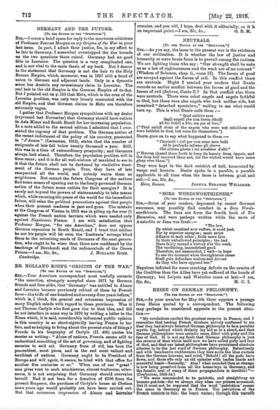GERMANY AND THE FUTURE.
[To Ts. Emma OF roe .•SFSOTB701...] Six,—I crave a brief space for reply to the courteous criticisms of Professor Forrest Morgan on my Origins of the TVar in your last issue. In part, I admit their justice, for, in my effort to be fair to Germany, I somewhat overstepped the due bounds on the two questions there raised. Germany had no good title to Lorraine. The question is a very complicated one, and ie not vital to the main thesis of my book. But I demur to the statement that Germany is not the heir to the Holy Roman Empire, which, moreover, was in 1697 still a bond of union to German and adjacent lands. Only in a dynastic sense has Austria any reversionary claim to Lorraine. The real heir to the old Empire ie the German Empire of to-day. But I pointed out on p.110 that Metz, which is the crux of the Lorraine problem, was only very loosely connected with the old Empire, and that German claims to Metz are therefore extremely vague.
I gather that Professor Morgan sympathizes with my desire (expressed last November) that Germany should have outlets in Asia Minor and South Brasil for her increasing population. In a note added to the second edition I admitted that I over- stated the urgency of that problem. The German author of the recent indictment of the policy of his country, presented is "J'Accuss" (Lausanne, 1915), states that the number of emigrants of late fell below twenty thousand a year. Still, this was in a time of extraordinary prosperity; and Germans always look ahead. Therefore the population problem will in time recur; and it is for all well-wishers of mankind to see to it that the future shall not be darkened by vindictive treat- ment of the German people. True, they have of late exasperated all the world, and nobody wants them as neiglaboura. But cannot the future Congress of the nations find some means of opening out to the freely governed German nation of the future some outlets for their energies ? It is surely not beyond the powers of statesmanship to take means which, while seeming the peace of the world for the immediate future, will relax the political precautions against that people when their present madness is past and gone. The mistake at the Congress of Vienna in 1815 was in piling up for ever (!) against the French nation barriers which were needed only against Napoleonic France. I see with satisfaction that Professor Morgan, "for one American," does not oppose German expansion in South Brazil, and I trust that neither he nor his people will let even the Lusitania' outrage blind them to the colonizing needs of Germans of the next genera. tion, who ought to be wiser than those now maddened by the teachings of Bernhardi and the rodomontade of the Crown


































 Previous page
Previous page